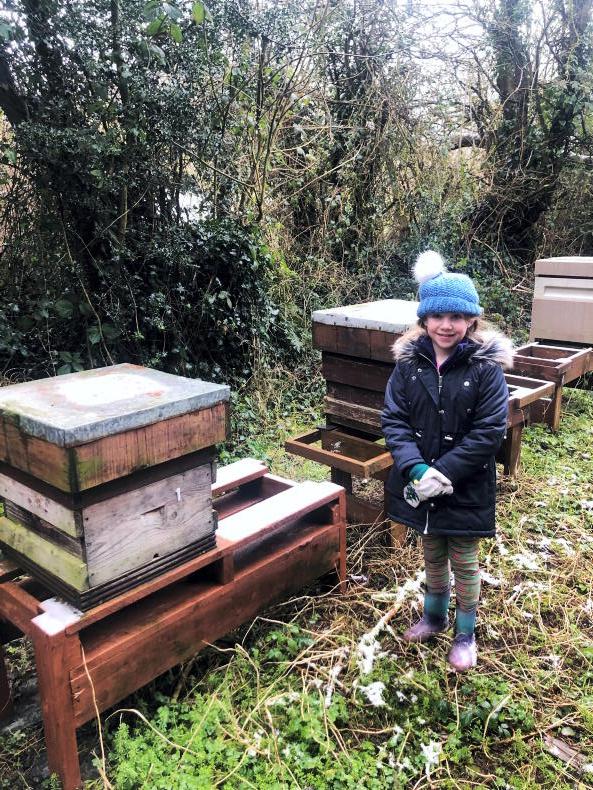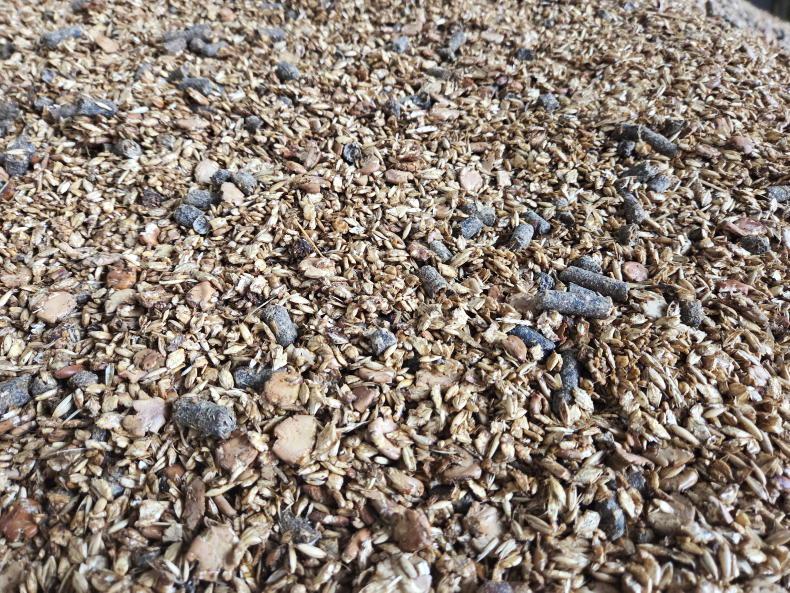It’s National Biodiversity Week with events running virtually this year. If you are on social media, you will see farmers across Ireland showcasing the different habitats that are supported on their farms.
One of the many ways that people are trying to promote biodiversity is through wildflower meadows. These meadows provide not only a fabulous blast of colour but are probably lower maintenance for those of us less green-fingered than others.
For this week’s cover feature, Mairead Lavery met with Julie Power, who is from a family with a long history in seed production. Julie set up her company, Blooming Native, to grow wildflowers and harvest the seeds having had her interest in sustainability deepened as she was travelling.

Raine McKeever inspecting the bee hives in her granny's forestry during the snow of early 2021. It's National Biodiversity Week (15-23 May 2021) with World Bee Day taking place on Thursday 20 May 2021.
A note of warning; if going this route, please use native Irish seed. Blackgrass, which has been found in some imported wildflower mixes, poses a severe threat to crops. It is important that we do not inadvertently do damage in our efforts to increase biodiversity.
Last week, a number of radio conversations in relation to the environment and farming caused anger amongst farmers. I will leave the environmental discussion to one side, as I wish to address an issue raised, which I have more direct experience of. In recent weeks I have been writing about topics that can cause a very real difference of opinion. And breastfeeding is very high on that list.
The argument was that there was no reason for Ireland to be supplying formula to the far side of the world
During one interview, the discussion turned to milk powders and the fact that Ireland is one of the largest producers of infant formula globally. The argument was that there was no reason for Ireland to be supplying formula to the far side of the world. The comment was made, and perhaps not challenged as the conversation was between two men, that “Chinese women come pre-equipped to feed their own children”.
Such a comment fails to recognise how difficult breastfeeding can be mentally and physically and for some women simply not possible
I am assuming that the inference here was that a woman with breasts should be able to breastfeed their child, thus negating the need for infant formula. Such a comment fails to recognise how difficult breastfeeding can be mentally and physically and for some women simply not possible.
This week, Margaret Hawkins speaks with lactation consultant Katie Mugan. Katie has some great tips for mums who are ready to wean their baby off the breast. She also flags some of the difficulties. Going back to work is one such difficulty. If a baby is being weaned off the breast under a year, the only option open to parents is infant formula.
A recent survey of 3,200 people carried out by Women in Food and Agriculture revealed how difficult it is for women to continue to nurse their children once they return to work
As I mentioned last week, the period of time that maternity leave is supported by social welfare (companies may differ) is 26 weeks. Therefore, there is a further 26 weeks before a baby is ready for the transition to cow’s milk.
A recent survey of 3,200 people carried out by Women in Food and Agriculture revealed how difficult it is for women to continue to nurse their children once they return to work. Three in five North American companies make accommodations for nursing mothers (57%) while just 22% of EU businesses provide such facilities. That means that among those surveyed, just three in 10 companies provide accommodation/facilities for nursing mothers.
There is nothing more important to a mother anywhere – Ireland, China or elsewhere – than safe nutritious food for her baby. Ireland provides that peace of mind with its dairy products. While environmental work is vital and ongoing, in terms of quality, safe dairy products, Ireland is right up there.
Read more
Equity for women in the workplace has to be more than just being ‘facilitated’
Sometimes it’s best to agree to disagree
It’s National Biodiversity Week with events running virtually this year. If you are on social media, you will see farmers across Ireland showcasing the different habitats that are supported on their farms.
One of the many ways that people are trying to promote biodiversity is through wildflower meadows. These meadows provide not only a fabulous blast of colour but are probably lower maintenance for those of us less green-fingered than others.
For this week’s cover feature, Mairead Lavery met with Julie Power, who is from a family with a long history in seed production. Julie set up her company, Blooming Native, to grow wildflowers and harvest the seeds having had her interest in sustainability deepened as she was travelling.

Raine McKeever inspecting the bee hives in her granny's forestry during the snow of early 2021. It's National Biodiversity Week (15-23 May 2021) with World Bee Day taking place on Thursday 20 May 2021.
A note of warning; if going this route, please use native Irish seed. Blackgrass, which has been found in some imported wildflower mixes, poses a severe threat to crops. It is important that we do not inadvertently do damage in our efforts to increase biodiversity.
Last week, a number of radio conversations in relation to the environment and farming caused anger amongst farmers. I will leave the environmental discussion to one side, as I wish to address an issue raised, which I have more direct experience of. In recent weeks I have been writing about topics that can cause a very real difference of opinion. And breastfeeding is very high on that list.
The argument was that there was no reason for Ireland to be supplying formula to the far side of the world
During one interview, the discussion turned to milk powders and the fact that Ireland is one of the largest producers of infant formula globally. The argument was that there was no reason for Ireland to be supplying formula to the far side of the world. The comment was made, and perhaps not challenged as the conversation was between two men, that “Chinese women come pre-equipped to feed their own children”.
Such a comment fails to recognise how difficult breastfeeding can be mentally and physically and for some women simply not possible
I am assuming that the inference here was that a woman with breasts should be able to breastfeed their child, thus negating the need for infant formula. Such a comment fails to recognise how difficult breastfeeding can be mentally and physically and for some women simply not possible.
This week, Margaret Hawkins speaks with lactation consultant Katie Mugan. Katie has some great tips for mums who are ready to wean their baby off the breast. She also flags some of the difficulties. Going back to work is one such difficulty. If a baby is being weaned off the breast under a year, the only option open to parents is infant formula.
A recent survey of 3,200 people carried out by Women in Food and Agriculture revealed how difficult it is for women to continue to nurse their children once they return to work
As I mentioned last week, the period of time that maternity leave is supported by social welfare (companies may differ) is 26 weeks. Therefore, there is a further 26 weeks before a baby is ready for the transition to cow’s milk.
A recent survey of 3,200 people carried out by Women in Food and Agriculture revealed how difficult it is for women to continue to nurse their children once they return to work. Three in five North American companies make accommodations for nursing mothers (57%) while just 22% of EU businesses provide such facilities. That means that among those surveyed, just three in 10 companies provide accommodation/facilities for nursing mothers.
There is nothing more important to a mother anywhere – Ireland, China or elsewhere – than safe nutritious food for her baby. Ireland provides that peace of mind with its dairy products. While environmental work is vital and ongoing, in terms of quality, safe dairy products, Ireland is right up there.
Read more
Equity for women in the workplace has to be more than just being ‘facilitated’
Sometimes it’s best to agree to disagree










SHARING OPTIONS